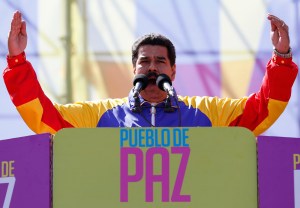Media, paramilitaries, abuses, and some blood



Submit to my peace, you fascists!
As the protests gripping Venezuela enter their 19th day (get the basics here), it’s time to take stock of what’s happened. What are the stories? What are the non-stories? What matters?
The stories
- The Media Blackout – From yanking a Colombian cable news channel off the air to taking an entire city offline, the government has made controlling the flow of information about the crisis a priority. This comes on the heels of the looming threat to newspapers all over the country, which we have documented extensively. President Maduro has already announced they will pull the plug on CNN En Español, an important source of independent information. Now their journos’ official credentials have been revoked. All told, the past two weeks have been dreadful for the right of Venezuelans to be informed. The result? Tons of rumors, tons of disinformation, tons of uncertainty.
- Paramilitaries: Let’s call a spade a spade: colectivos are paramilitaries. It’s silly that chavistas are somehow trying to minimize the role of these government-sponsored groups that now roam freely in the streets of Venezuela, heavily armed, accountable to God-only-knows whom. They have been repeatedly lionized by the government. They are christened by Ministers as the main line of defense of the Revolution. They talk to the foreign press and gleefully display their weapons and their fire power. Chavista governors give them orders via Twitter. And numerous eyewitnesses tell stories of violence. True – they don’t always shoot live ammo. Sometimes their role is simply to intimidate. Regardless, they are real, and they are not going anywhere.
- Human Rights Abuses – From the jailing of Leopoldo López to the alleged torture of student demonstrators, it seems clear that Venezuela crossed a rubicon in the past few days. This has been a PR disaster for the government, with everyone from Amnesty International to Human Rights Watch to (gulp) Madonna weighing in. I don’t know if they care or not, but Maduro’s cast in international public opinion seems set for now. He is an abusive, mustachoed thug. Any lingering claim to the moral high-ground or to hemispheric leadership that the revolution may once have held on to died this month.
The non-stories
- Bloodshed – In spite of the deaths of six protestors, so far this is not yet a terribly bloody ordeal. To be clear, any death is one death too many. But we should have some perspective: this is not Tiananmen. It is not even Ukraine. Of course, this could change at any time, but we must be precise – Venezuelans are, so far, not being massacred indiscriminately by government forces. Let’s be thankful for that.
- The non-coup – The government has tried mightily to frame this as a “coup.” It’s a tough sell given that protesters are severely outgunned, and so far no member of the military has publicly condemned the government. Maduro retains a tight grip on the military, and ultimately, they are the ones who stage coups. The coup chatter is hot air: maybe it speaks to the chavista hardcore base, but everyone else discounts it.
- Everybody’s a Fascist – Of every three words spilling out of chavista talking heads, at least one of them is “fascist.” Everyone in the opposition is, apparently, a fascist. This is a turn-off for the media, who don’t really know what to do with the term. Is the opposition following Mussolini? How do you square the term with the fact that the opposition includes left-of-center and right-of-center people? Are housewives banging pots and pans also … fascist? As a marketing tool, “fascist” is going the way of “New Coke” – nowhere.
Caracas Chronicles is 100% reader-supported.
We’ve been able to hang on for 22 years in one of the craziest media landscapes in the world. We’ve seen different media outlets in Venezuela (and abroad) closing shop, something we’re looking to avoid at all costs. Your collaboration goes a long way in helping us weather the storm.
Donate




